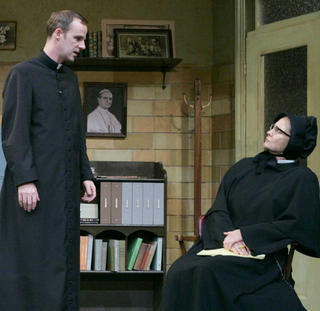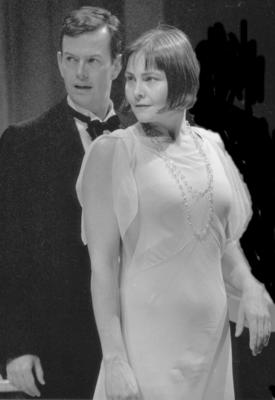[Advertisement]
[Advertisement]

TICKET / INFO
- StudentRush
- New York Show Tickets
- Givenik.com
- Telecharge.com
- Ticketmaster.com
- Group Sales Box Office
- Frugal TheaterGoer
- Broadway for Broke People
- Playbill's Rush/Lottery/SR
- Seating Charts
COMMUNITY
NEWS
- Back Stage
- Bloomberg
- Broadway.com
- BroadwayWorld
- Entertainment Weekly
- NYTheatre.com
- New York Magazine
- The New York Daily News
- The New York Post
- The New York Times
- The New Yorker
- Newsday
- NiteLife Exchange
- Playbill
- Show Business Weekly
- The Star-Ledger
- Talkin'Broadway
- TheaterMania.com
- Time Out New York
- American Theatre Magazine
- Theatre Development Fund (TDF)
- Best of Off-Broadway
- The Village Voice
- Variety
- The Wall Street Journal
- Journal News
REVIEWS
- The New York Times
- Variety
- New York Post
- NY1
- Aisle Say
- CurtainUp
- DC Theatre Scene
- Show Showdown
- Stage and Cinema
- StageGrade
- Talk Entertainment
- TotalTheater.com
- Off-Off Broadway Review
- TheaterOnline.com
- TheaterScene.net
- TheaterNewsOnline.com
WEST END
- The Stage
- 1st 4 London Theatre Tickets
- Book Your Theatre Tickets
- Compare Theatre Tickets.co.uk
- Theatre.com
- Whatsonstage.com [UK]
- ATW - London
- Musical Stages [UK]
- Albemarle of London
- Londontheatre.co.uk
- Google News
- Show Pairs
- ILoveTheatre.com
- The Official London Theatre Guide
- UK Tickets
BOSTON
CHICAGO
LA/SF
COLUMNS
- Peter Bart
- Andrew Cohen
- Ken Davenport
- Tim Dunleavy
- Peter Filichia
- Andrew Gans
- Ernio Hernandez
- Harry Haun
- Chad Jones
- Chris Jones
- James Marino
- Joel Markowitz
- Matthew Murray
- Michael Musto
- Ellis Nassour
- Tom Nondorf
- Richard Ouzounian
- Michael Portantiere
- Rex Reed
- Michael Riedel
- Frank Rizzo
- Richard Seff
- Frank Scheck
- Mark Shenton
- John Simon
- Robert Simonson
- Steve on Broadway (SOB)
- Steven Suskin
- Terry Teachout
- Theater Corps
- Elisabeth Vincentelli
- Hedy Weiss
- Matt Windman
- Linda Winer
- Matt Wolf
PODCAST
RADIO
TV
- Theater Talk
- BlueGobo.com
- Classic Arts Showcase
- American Theatre Wing Seminars
- Women in Theatre
- NY1
- WCBS [2]
- WNBC [4]
- FOX [5]
- WABC [7]
- WWOR [9]
- WPIX [11]
- Channel 13
- Hulu
- YouTube
AWARDS
- Tony Central
- Oscar Central
- Tony Awards
- Drama Desk Awards
- The Drama League Awards
- Lortel Awards
- Academy Awards
- Emmy Awards
- Grammy Awards
- GoldDerby
DATABASE
- Internet Broadway Database
- Internet Off-Broadway Database
- Internet Movie Database
- Internet Theatre Database
- Musical Cast Album Database
- [CastAlbums.org]
- Show Music on Record Database (LOC)
- CurtainUp Master Index of Reviews
- Musical Heaven
- StageSpecs.org
ROAD HOUSES
- Gammage [AZ]
- Golden Gate [CA]
- Curran [CA]
- Orpheum [CA]
- Community Center [CA]
- Civic [CA]
- Ahmanson [CA]
- Pantages [CA]
- Temple Hoyne Buell [CO]
- Palace [CT]
- Rich Forum [CT]
- Shubert [CT]
- Bushnell [CT]
- Chevrolet [CT]
- Broward Center [FL]
- Jackie Gleason [FL]
- Fox [GA]
- Civic Center [IA]
- Cadillac Palace [IL]
- Ford Center/Oriental [IL]
- The Bank of America Theatre [IL]
- Auditorium Theatre of Roosevelt University [IL]
- Kentucky Center [KY]
- France-Merrick [MD]
- Colonial [MA]
- Wilbur [MA]
- Charles [MA]
- Wang [MA]
- Wharton Center [MI]
- Whiting [MI]
- Fisher [MI]
- Masonic Temple [MI]
- Orpheum, State, and Pantages [MN]
- Fabulous Fox [MO]
- New Jersey PAC [NJ]
- Auditorium Center [NY]
- Proctors [NY]
- Shea's PAC [NY]
- BTI Center [NC]
- Blumenthal PAC [NC]
- Schuster PAC [OH]
- Playhouse Square [OH]
- Aronoff Center [OH]
- Ohio [OH]
- Victoria Theatre [OH]
- Birmingham Jefferson [OH]
- Merriam Theater [PA]
- Academy of Music [PA]
- Benedum Center [PA]
- Providence PAC [RI]
- Orpheum [TN]
- Hobby Center [TX]
- Music Hall [TX]
- Bass Hall [TX]
- Paramount [WA]
- Fox Cities PAC [WI]
- Marcus Center [WI]
- Weidner Center [WI]
FESTIVALS
- The New York International Fringe Festival
- The American Living Room Festival
- Summer Play Festival
- The New York Musical Theatre Festival
- Adirondack Theatre Festival
- NAMT: Festival of New Musicals
SPECIAL
- BC/EFA: Broadway Cares / Equity Fights AIDS
- The Actors' Fund
- Stage Directors and Choreographers Foundation
EDUCATION
- Google Shakespeare
- Actor Tips
- AACT
- ArtSearch
- Broadway Classroom
- Broadway Educational Alliance
- Camp Broadway
- Great Groups - New York Actors
- Theatre Communications Group (TCG)
- Theatre Development Fund (TDF)
- Off-Broadway Theater Information Center
UNIONS/TRADE
- AEA
- SAG
- AFTRA
- AGMA
- The League
- APAP
- Local 1
- ATPAM
- IATSE
- AFM
- AFM - Local 802
- Treasurers & Ticket Sellers Union
- DGA
- Dramatists Guild
- USA 829
- WGA, East
- WGA, West
- SSD&C
- AFL-CIO
- League of Professional Theatre Women
NYC NON-PROFITS
- Cherry Lane Theatre
- City Center
- Drama Dept.
- Ensemble Studio Theater
- Jean Cocteau Rep.
- Lark
- Lincoln Center Theater
- Lincoln Center for the Performing Arts
- Lucille Lortel Foundation
- Manhattan Theatre Club
- MCC
- Mint
- Pearl Theatre Company
- Public Theater
- Roundabout
- Second Stage
- Signature
- The Vineyard Theatre
- The York Theatre Company
REGIONAL
- Actors Theatre
- Alabama Shakespeare Festival
- Alley Theatre
- ACT
- American Musical Theatre in San Jose
- American Repertory
- Arena Stage
- Barrington Stage Company
- Bay Street Theatre
- Berkeley Rep
- Casa Manana
- Chicago Shakespeare Theater
- Cincinnati Playhouse
- CTC
- Dallas Summer Musicals
- Dallas Theater Center
- Denver Center
- George Street
- Goodman
- Guthrie
- Goodspeed
- Hartford Stage
- Hudson Stage Company
- Theatre de la Jeune Lune
- Kennedy Center
- La Jolla
- Long Wharf
- Lyric Stage
- Mark Taper Forum
- McCarter
- New Jersey Rep
- North Shore
- Old Globe
- Ordway
- Oregon Shakespeare
- Paper Mill
- Prince Music Theater
- The Rep (St. Louis)
- Sacramento Music Circus
- San Francisco Mime Troupe
- Seattle Rep
- Shakespeare Theatre Co. (DC)
- The Shakespeare Theatre of New Jersey
- South Coast Rep
- Steppenwolf
- Theater of the Stars (GA)
- Theater J (DC)
- Theater Under the Stars (TX)
- Trinity Rep
- Two River Theater Company
- Utah
- Victory Gardens
- Westport
- Williamstown
- Yale Rep
KEWL
[Advertisement]
CHERRY JONES : A RETROSPECTIVE WRAPPING HERSELF IN HER CHARACTERS AND MESMERIZING AUDIENCES
by Ellis Nassour
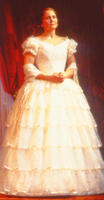
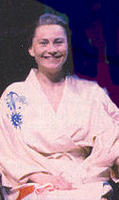
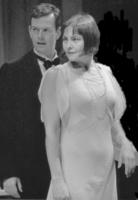

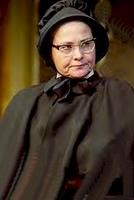
Having just won her second Tony and Drama Desk Awards for Best Actress [after numerous nominations], it will come as no surprise to hear that Cherry Jones soars in John Patrick Shanley's blistering 2005 Pulitizer Prize, Tony and Drama Desk-winning Doubt A Parable.
She wouldn't necessarily agree with this assessment, but where many people, even a sizeable share of New York theatergoers, used to ask "Cherry Jones?" now they don't.
Jones is one of our preeminent American theatre actresses. She's been called "the high priestess of New York theatre." Told of these accolades, Jones shrugs "Oh, my!" She laughs, "I'm just happy to be acting."
That's all this Southern charmer with the raspy voice ever wanted to do.
Currently portraying Sister Aloysius, a strong-willed previously married woman in her 40s who's become an even stronger-willed nun and Catholic grammar school principal, Jones describes her experience as "a dream. It doesn't get better than this!"
Two-time Tony and Drama Desk winning Jones in Doubt,
co-starring 2005 Tony-nominated and Drama Desk-
winning Best Actor Br"an F. O'Byrne :
The pyrotechnics of Shanley's drama begin when the stern nun announces from behind her thick eyeglasses and traditional black habit and wimple her suspicions of a certain nature about a popular, street-wise priest.
"The unexpected magic of Doubt, says Jones, "is the uncertainty principle. Audiences are always divided. Father Flynn has his loyal supporters, who feel Aloysius has railroaded him. She continues, "Audiences are leaving the theatre talking about the play and not about us, the actors. They argue whether I'm right and about how I could think such things of a fine priest. It's even been suggested that I might want to leave with a bodyguard!"
It's what theater is all about, what makes an actor want to act. "You enter the fantasy," notes Jones, "You wrap yourself in your character and around the audience. And you never forget the persons in the last row. You must project to reach them. Even in your offstage moments, in the wings or doing a quick change, you're 'on,' ëout there.' You're always watching, listening, totally immersed and involved. And when you reach them, the play becomes a very personal thing. Nothing gets better than that for an actor. When that happens, we know we've done our job."
Jones has been doing her "job" since around the time she was three years old, her first time in front of an audience.
She hails from Paris, Tennessee, a county seat of 10,000 in the western part of the state. Her father was a florist, and her mother a skilled and beloved English teacher, who instilled in Jones a love for her great passions, English and American literature.
She was "bitten by the bug" at three in a tap recital. "When we took our bows," laughed Jones, "the applause did me in. I said, 'Gee, this is great.' I didn't realize that the loudest clapping was coming from my family."
Jones with 2005 Tony-nominee Heather Goldenhersh in Doubt :
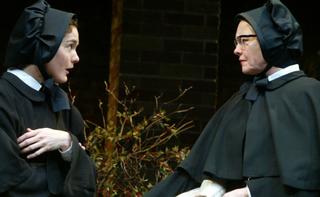
"All I could think was theater," recalls Jones, "but my real inspiration came my junior year when I attended a theater seminar at Northwestern. Seeing Colleen Dewhurst in A Moon For The Misbegotten fully defined my future. She opened a whole new world of what theatre could be. I'd never heard language like that. I'd never seen a woman onstage that strong."
O'Neill's raw story of tormented souls, Moon tells of the infatuation of James Tyrone Jr., the hard-drinking, self-loathing older son of Mary and James [of Long Day's Journey Into Night], with earthy Josie Hogan, a rascal farmer's daughter with low self-esteem.
[Written in 1943, it failed in a 1947 pre-Broadway tryout. Wendy Hiller starred in the 1957 Broadway premiere. The most memorable revival, which Jones saw on tour, was in 1973, when Jose Quintero directed Colleen Dewhurst and Jason Robards. In 1984, a production starred Kate Nelligan.]
No sooner than she was out of high school, Jones headed to Pittsburgh to study drama at Carnegie Mellon "living and breathing acting. I was overweight, five-foot nine, a big kid! But I got character parts that helped me grow. In my four years, we had four acting heads - each proclaiming their method was the true way, the only way. I quickly learned that was a crock of - of baloney!"
Rarely, says Jones, did a role intimidate her, but daunted by her memories of Dewhurst, she turned down playing Josie at Baltimore's Center Stage. "I thought I'd never be able to do it," she explained. "I felt unprepared. But as the months passed, I said 'I've got to try. Miss Dewhurst would want me to.' The night after Miss Dewhurst died [1991], I called and said I'd like to give it a try."
Suddenly Jones was up and coming. "I found I could get into doors, but I never looked at it that way. Every play I've done has been exactly what I wanted to be doing at that point. I saw it as steps toward more options. Having worked in every different style -method, mime, you name it - prepared me for working with the various style of directors."
And, she reports that the "baloney" proved valuable when she acted with rep companies across the country and Off Broadway - Portland Stage, Arena Stage, American Jewish Theatre - until she found herself up and coming. "I wasn't your classic ingenue," she smiles, "but I was going to give it a try.
"After slinging chicken a couple of years," she continues, "and thinking I'd never work as an actress until I was thirty-five" she was accepted into BAM's repertory company.
Jones was crushed when BAM didn't ask her back for a second season. "We'd become like family," she notes, "but I just hadn't excelled. I wasn't developed enough for the big time."
She auditioned in Boston for American Repertory Theatre and got the job. "It was the luckiest break. I basically grew up there. Over ten years, I did six seasons, over twenty-five productions. It was heaven!"
Her first big New York break came in 1983's Claptrap at the original Upper East Side home of MTC. She made her Broadway debut in 1987 in Tommy Tune's short-lived Stepping Out, which also featured Don Amendolla, Meagan Fay, Carole Shelley and Carol Woods.
In 1988, after a national tour, she arrived back on Broadway at the Hellinger in Macbeth starring Christopher Plummer and Glenda Jackson.
"There was a great deal of turnover," she laughs. "In Baltimore, we performed at night and, by day, rehearsed the revised version. Glenda was generous and lots of fun. I ended most evenings in her dressing room, enjoying a tall glass of wine." Other stories of that experience and her friendship with Jackson, she says, could fill several articles!
There'd been small roles on TV and in films since 1986.
Late in the run of Angels in America, Jones joined the company as the Angel.
Then came Our Country's Good, by Timberlake Wertenbaker [based on the novel The Playmaker by Thomas Keneally] and directed by Mark Lamos. Jones played the dual roles of the Reverend Johnson, a fire and brimstoner, and Liz Mordon, a surly convict in Britain's first penal colony in Australia.
Her performance won critical acclaim and, in a move that shocked her, garnered her a 1991 Tony nomination as Best Actress, in a play which essentially had an ensemble cast [Amelia Campbell, Peter Frechette and J. Smith-Cameron]. which featured an ensemble cast. The nominations were controversial that year because the Tony nominators failed to nominate Jane Alexander for her tour de force role in Shadowlands.
Though honored to be nominated, Jones felt that Alexander had been slighted and felt that if she was to be nominated, it should have been in the Featured category.
"I had the biggest laugh in the world. If I was to be nominated, the supporting category was where I should have been since we were an ensemble." The theatre community was outraged over the omission of a nomination for Jane Alexander as poet Joy Gresham in Shadowlands. Jones felt that Alexander "certainly should have had my slot. But I didn't pick it, so I had to show up. It was wonderful getting to go to the Tonys, knowing that I didn't have a shot in hell. I just went and had a good time."
With her nomination came fabulous offers and a huge increase in salary, right? "Not!" screams Jones. "It didn't take me toward nothing! It just kept me right where I was, which was where I was happy to be, working at Off Broadway houses on interesting scripts with interesting young directors and actors."
And work she did - "anytime, anywhere I could." There were side benefits. For instance, suddenly Jones found directors and casting directors knew her body of work so well that she often got cast without benefit of audition or, as in the case of Paula Vogel's The Baltimore Waltz in 1992 at Circle Rep, even an interview.
At Chicago's Goodman, where she worked earlier with Frank Galatti in the dual roles of Shenteh/ Shuita [man/woman] in The Good Person of Setzuan, Jones played Hannah Jelkes in their 1994 revival of Tennessee Williams' Night of the Iguana, "a most extraordinary role."
The Goodman Theatre production of Night of the Iguana, opposite William Peterson :
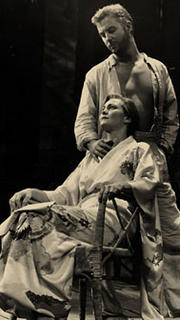
The protagonist is a womanizing, defrocked minister and sometime tour guide named Shannon [CSI's William Petersen] who lands at the 1940s rundown Mexican beach hotel run by the recently widowed Maxine. The only "guests" are Hannah, a world-weary, broke but proud spinster painter with her 97-year-old grandfather, billed as the world's oldest poet.
For a 40-year-old play, says Jones, "I felt Iguana was very present. It's about healing, forgiveness, morality, sex and sensual spiritual essences. The characters are multi-layered and the themes so universal anyone can connect with what Williams is saying. Also, it's victimless. That's most unusual for him!"
"I didn't know how to find her greatness as a human being," Jones explained. "How do you play her and not appear to be faking it? When acting is fraudulent onstage, you want to slink away under a rock. I thought 'I'm never gonna get this woman.' She's so enlightened, an advanced human spirit. I work externally and internally, so I carefully crafted her house, the residue of her Nantucket accent, her carriage, and her bearing. I hoped that she'd slowly move in and take me by the hand and show me how she should be played, which she did. It was a very spiritual bonding."
Jones says she "worked externally" to get Hannah right. "I concentrated on her New England accent, straight posture and her crisp coolness combined with a wry humor. I tried to build her a home and hoped that she'd start to inhabit it. Gradually the speeches started to have a power and simplicity without my having to control them. I felt her hand in mine, and the skin started to feel like hers."
For her performance, she received a JEFF Award for Best Actress, her second in Chicago theater.
She credits director Robert Falls, who restored several speeches Williams cut to placate Bette Davis, who originated the role of Maxine on Broadway [replaced not long after by Shelley Winters]. "He embraced it all," reported Jones, "and orchestrated it like a musician. Tennessee created wonderful moods between the volcanic explosions, but abruptly broke them. Bob found a way to keep the tremulous suspension hanging. Now the play builds on itself in a way I know Tennessee would be pleased with."
Jones and Marsha Mason, on Broadway in Night of the Iguana:
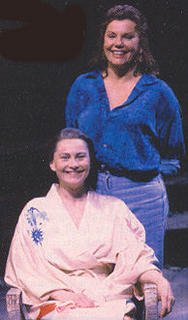
For Roundabout's 1996 Broadway production, her co-star was Marsha Mason as Maxine Faulk.
Though Jones received her share of excellent reviews in Chicago, she wasn't sure that they advanced her career. "In some people's eyes, they did. But if it's not New York, most people don't know about it." However, she does think that when Falls came to Lincoln Center Theater to direct Suburbia, he might have planted a seed with [late] director Gerald Guiterrez, who "out of the blue" decided to cast her as the dominated daughter Catherine Sloper in New York's elegant Victorian age in LCT's 1995 revival of The Heiress.
Jones in her Tony and Drama Desk Award-winning role in The Heiress :
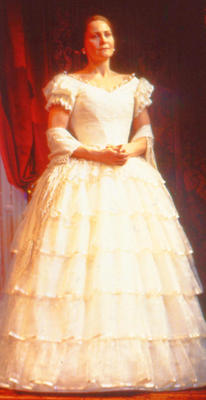 For her brilliantly rigid portrayal, Jones received audience and critical acclaim. She starred opposite Philip Bosco, Frances Sternhagen and Jon Tenney. The play was written by Ruth and Augustus Goetz, based on the Henry James novel, Washington Square. "Thanks to a wonderful cast and Gerry, it was a wonderful time and the culmination of all my experiences. I'd played different elements of Catherine in other portrayals, and had learned with each role what works from that deep place inside you and how you communicate that technically over the footlights."
For her brilliantly rigid portrayal, Jones received audience and critical acclaim. She starred opposite Philip Bosco, Frances Sternhagen and Jon Tenney. The play was written by Ruth and Augustus Goetz, based on the Henry James novel, Washington Square. "Thanks to a wonderful cast and Gerry, it was a wonderful time and the culmination of all my experiences. I'd played different elements of Catherine in other portrayals, and had learned with each role what works from that deep place inside you and how you communicate that technically over the footlights."
At the time, Gutierrez said of Jones, then in her mid-30s, "After years of apprenticing and playing everything from bits and character parts to leads in a huge body of regional work, Cherry is about to shed her anonymity as the ëknown unknown' and be catapulted into that rarefied category of Broadway leading lady."
How true, and the role won Jones her first Tony for Best Actress and opened all sorts of doors. "It was also the catalyst to getting good representation," she explains, "and opportunities to be seen to better advantage in other media." She adds that, on the basis of seeing her in The Heiress, Robert Redford cast her in a featured role as a veterinarian in The Horse Whisperer, in which he starred and also directed.
Recently, when she arrived seemingly in a bit of an agitated state for an interview, Jones was asked if she was feeling well. "No," she replied. "I'm a little shaken up." At first, she was reticent to discuss why but, when pushed a bit, she said she'd just come from a screening of The Heiress.
"It was a trip back in time," she said solemly, "seeing for the first time ëoutside of myself' how I played Catherine. It was a ghastly experience!"
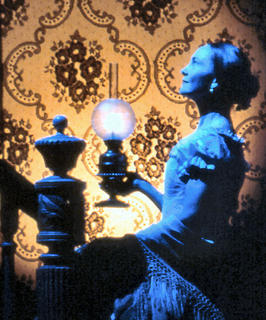
Asked how such a performance could be seen as anything other than mesmerizing, she moaned, "Oh, my! I was so mannered! Why did Gerry let me talk like that? Such melodrama! As I watched, I kept hanging my head. I relived every moment and how it felt. It was nerve-racking."
The only thing that made it bearable, adds Jones, "were the wonderful performances of Philip Bosco and Frances Sternhagen," with whom she established strong bonds.
Jones had a major triumph in 1997 at San Diego's Old Globe and with LCT as champion swimmer Mabel Tidings Bigelow, chronicling her from early teens to her 90s, in Tina Howe's Pride's Crossing. At LCT, her co-stars were Dylan Baker, David Lansbury and Casey Biggs. In Pride's Crossing - Jones with Dylan Baker :
Jones recalls an interview Charlie Rose did with Maggie Smith on the craft of acting. "He wondered when she and Judi Dench got together if they talked about their craft. Smith replied, 'We talk about the terror of it.'" And it wasn't always smoothing sailing for Jones. In 1999, at Chicago's Goodman in a revival of Moon, co-starring Gabriel Byrne and Roy Dotrice, she battled depression brought on by a "middle-aged lack of confidence." Jones admits she experienced stage fright for the first time. At one point she even considered walking offstage. "But I couldn't," she explains. "That would have been more humiliating than facing what I was going through." Jones states that what added to her dilemma was how much more was expected of her after winning the Tony. When that production of Moon came to Broadway, Jones was still uneasy. "You have a standard you're not always able to meet. When the public has a standard, coupled with your own, it creates greater stress. It's more fun to be the kid coming up the ranks." In spite of a vivid and raw portrayal, reviews in both instances were surprisingly cool. However, she was rewarded with a third Tony Award nomination as Best Actress. [Byrne and Dotrice were also nominated; Dotrice won for Featured Actor.] There have been roles Jones says she's had difficulty getting into, but eventually she would "nail" them. Even when she had the roughest of times, she states she was never fired, "although when actors I worked with were fired, I felt they who were the luckiest sons-of-bitches. There was a flaw in the writing or direction and, as a scapegoat, the actor was let go more out of panic on the part of the director or producer. They thought by letting them go that would solve the problem. Of course, there you are left to carry on in something that's never going to quite come together." Other recent Broadway work included Roundabout's Major Barbara [2001], co-starred with Dana Ivey, David Lansbury and Denis O'Hare; and her musical debut - yes, Cherry Jones singing and dancing! [music and lyrics by Marvin Hamlisch and Craig Carnelia (no cast album was recorded)] - in Nora Ephron's Imaginary Friends [2002] opposite Swoosie Kurtz as battling divas Mary McCarthy and Lillian Hellman. Jones and Swoosie Kurtz sang and danced in Imaginary Friends : "No! No! No!" she states emphatically. "I never expected Hollywood to come calling, even after The Heiress. I didn't know anything about film and never spent time in L.A. Movies and TV are fun, as long as you know you've got something to come home to. Theater will always be my primary focus. I'm not ambitious. [Evidence of that is that she passed on a role in Cold Mountain.] My agents are understanding. I never feel pressure to accept roles I don't want." Amazingly, in view of her success onstage, Jones hasn't ask her agents to go after starring roles. "Not many women my age [she's 48] are in the Hollywood mindset," she laughs. "Where I'm at, I have to specialize in nuns and FBI agents [Oceans 12]! But I love the low-pressure character parts, because I have the opportunity to watch and learn There was no trepidation, no unsettled nerves and certainly no uncertainty when Hughes sent her the script for Doubt. "I was eagerly looking forward to working in my first Shanley play and with Br"an, whom I caught him in Frozen. And I sat there totally frozen in awe." Jones and O'Bryne ~ having the time of their lives Watching Jones and O'Byrne onstage, it leaps out at you that these actors not only love what they're doing, but that they live to do it. Their challenge is to plant uncertainty and divide audiences. Jones and O'Byrne do their jobs well. Their performances -- along with Shanley's trademark twists and turns -- are keeping theatergoers on the edge of their seats. So much so that, Doubt recently set a new Kerr house record. "It goes by so fast you don't realize it's ninety minutes," states Jones. "It's like you step on and get off!" O'Byrne reponds. Growing up Methodist in Tennessee, the Catholic Church, laughs Jones, was the most exotic thing in town. Her two best friends were Catholic. "I'd go to mass with them and they'd show me these little slivers of bone that were relics of saints. I used to wonder, with so many Catholic churches, if there'd be enough to go around." Frequently, she heard stories about the nuns. "Their fiefdom was the school system," reports Jones. "They were trained to be field marshals: discipline, order, rigidity. When I heard how they used clickers in church, I couldn't help but laugh. Click, you kneel! Click, you stand!" Amid the seriousness of Doubt, Jones points out, "I've found humor to be mined, not surprising since John Patrick is also the author of Moonstruck." She adds, "I'm having fun pleading Aloysius' case - especially the one about ball point pens, which she says should never have allowed to enter schools because they make students press down and end up writing like monkeys. No one has penmanship like someone who went to Catholic school! You can spot one a mile away." She remembers the time when young men going into the priesthood were deified in their communities: "But, sadly, once they were priests, they were never allowed a normal adult relationship with anyone outside the cloth who understood what they're going through. That had to do something to the soul and mind. We're sexual beings. I can't believe that eventually Catholic priests won't be allowed to marry. Otherwise, they're going to be beating the bushes looking for vocations." In fact, Doubt's battle of the wills becomes a vicious cat and mouse game. Jones aptly compares it to "something akin to the gunfight at the O.K. Corral." The onstage confrontations between herself and O'Byrne, are meant to roil audiences, but, laughs Jones, "they seem to really enjoy them!" Sister Aloysius, observes Jones, "is a formidable character. She runs her fiefdom with an iron hand. She believes in her methods and vigorously imposes them. Her instincts are everything; and when it comes to her suspicions about this priest, she has no doubt whatsoever." She plans to be in Doubt for as long as they want her. "It's been an exciting adventure. We began in this tiny rehearsal space, opened at MTC and, as we played before our audiences, we realized something extraordinary was happening between them and this play. No matter how we present our case, what we find fascinating is that audiences are never quite convinced." "It's amazing," admits O'Byrne with a puzzled grin. "They're always so divided. Flynn has his loyal supporters, who feel Aloysius has railroaded him. One will say, 'He's guilty!" and another will say, ëNo, she's guilty!'" "They feel the play is theirs," Jones states, "and if there's a false moment they'd feel betrayed. From the second the house lights dim, audiences tell us they're completely engaged. It's because it's so much fun. There's not a single scene where you go, 'I hope this goes well' or 'I can't wait to get past this.' "What's bizarre," adds O'Byrne, "is that when audiences are leaving the theatre, they're not talking about us, the actors, but about the play. It's become a very personal thing." "It's gotten so intense," laughs Jones, "that it's been suggested I might need a body guard when I leave the theatre! But what's really interesting is that those people who agree that Aloysius is right merely say ëFather Flynn's guilty,' while those who think she's wrong call her ëdespicable.'" O'Byrne even recalls one woman crying when someone said his character was guilty. "She said, 'You're nuts! How can you think that?'" The featured cast, which was Tony-nominated: Heather Goldenhersh [Freedom-land, Last Dance] plays a younger nun who's quite intimidated by Sister Aloysius' methods; and Adriane Lenox [the 2005 Tony winner and Shug Avery in the Atlanta premiere of the musical adaptation of The Color Purple, The Moon in Caroline or Change at the Public], who portrays the student's mother. Jones and O'Byrne are highly complimentary of Lenox and Goldenhersh. Of them and O'Byrne, Jones says, "I cannot wait to get to the theatre to climb into that ësandbox' and fuss at ëem." In an analogy to the recent baseball steroid scandals, O'Byrne confessed that he takes "performance-enhancing drugs." A huge smile erupts as he adds, "My pill is Cherry, eight times a week. It makes me feel good all the time and it also give me strength to play when I go out onstage. My ëdealer' is Shanley, who's been dealing out ëdrugs' for a long time now, but not ever as potent as this one." He and Jones admit taking another "pill," which a lot of actors find hard to swallow. "It's called a director -- our director," states O'Byrne, referring to Tony Award-winner Hughes, who also directed him in Frozen. "Doug is the sweetest, smartest and gentlest director," reports Jones. "But you shouldn't be surprised at those qualities, since he grew up in that proverbial trunk [the son of Barnard and Helen Hughes]. What I like about Doug is that early in rehearsals he'll take you through the play and then allows you to go back and work on details." She states that she owes Hughes and Shanley "my first born!" Adding with a laugh, "which is seeming more and more unlikely to happen." Jones explained that the greatest gift for an actor is to be in a play "that you want to keep doing - and I've wanted to do this more than any play. I want to keep finessing it, because the more we finess the better we get." Of her chosen profession, Jones says, "I wish there were more opportunities for those breaking into acting. Unless you give yourself completely, it's difficult. Even during the hardest times, it seemed effortless, but it wasn't. I always tell my agents if a Quaker would do it, I'll do it. But, luckily, I've been able to devote my efforts to what I wanted to do. Because of that, I'm not the most well rounded person. But there've certainly been other compensations." Regarding film vs. theater, she states, "In film, you play a character. There's no projection. The camera's in front of you and the boom mike looms overhead. It's a world of fifteen-second bites. You have make-up and wardrobe fussing over you and 300 others concentrating on that tiny sequence. It's incredible to have all that manpower and imagination to bring to life one moment. "I love the language of the theater," she continues. "There's a heightened, articulate, poetic language that I crave in my work that I just don't think you get much of a shot at in movies, even the best of them." There's something childlike about theater, she observes. "You enter the fantasy. You wrap yourself around the audience and are your character. And you can never forget the persons in those seats in the last row of the balcony. You must project to reach them. Even in your offstage moments, in the wings or doing a quick change, you're 'out there' because you're listening, watching, totally immersed and involved." As she reminisced about her theatrical career, Jones called herself "the luckiest actress in the world. "I've done so much more than I have any right to, then a part like Sister Aloysius comes along and it's just the topping on the dessert!" >>>>>>>>>>>>>
Dotrice reached in London where he and Byrne just completed Played with Val Kilmer, said, "The three of us had problems in Chicago. Cherry and Gabriel were having difficulties coming to grips with their characters. I never understood why but both felt inadequate and far from confident. My wife, Kay, convinced them that all the pieces were there and they just had to relax and enjoy it."
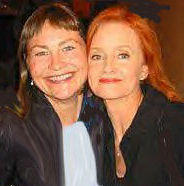
Prior to the opening of Doubt at MTC late last year, Jones had been absent from the New York stage since summer 2003 and her acclaimed performance Off Broadway in Flesh and Blood, Peter Gaitens' adaptation of Michael Cunningham's novel about several generations of an American family. She was gone so long that some prominent guest starring roles on such TV series as The West Wing, many fans were worried that she'd gone Hollywood.
Jones guiltily admits to loving the ambience of Hollywood. "I'm at that career point where I find these character parts in film delicious to play around with. But then to have this magnificent part come along in Doubt, well, is the icing on the cake. It arrived at just the right time because I was itching to get back to the stage. It'd been while since I went 'Ohhh!' after reading a script. So I jumped at it."
Doubt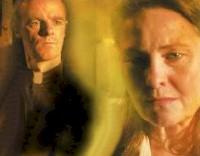
O'Byrne is the winner of the 2005 Drama Desk Award as Outstanding Actor and a 2005 Tony Award-nominee for Best Actor [he won the 2004 Featured Actor Tony for his portrayal of a serial killer in Frozen and played the priest in Clint Eastwood's Academy Award-winning Million Dollar Baby.]
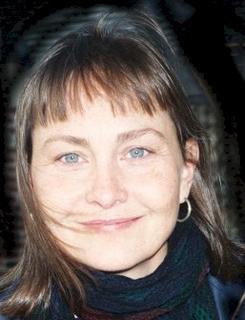 CHERRY JONES : Awards and Nominations:
CHERRY JONES : Awards and Nominations:
1991: Tony Award nomination, Best Actress in a Play, Our Country's Good
1992: OBIE Award, Outstanding Performance, The Baltimore Waltz
1993: JEFF [Joseph Jefferson] Award, Best Actress, The Good Person of Setzuan [Goodman]
1994: JEFF Award, Best Actress, Night of the Iguana [Goodman]
1995: Drama League, Distiguished Performance Award, The Heiress
1995: Outer Critics Circle Award, Outstanding Actress in a Play,
>>>> The Heiress
1995: Drama Desk Award, Outstanding Actress in a Play, The Heiress
1995: Tony Award, Best Actress in a Play, The Heiress
1998: Lucille Lortel Award, Oustanding Actress in a Play, Pride's Crossing
1998: Outer Critics Circle Award, Oustanding Actress in a Play, Pride's Crossing
1998: Drama Desk Award, Outstanding Actress in a Play, Pride's Crossing
1998: Madge Evans & Sidney Kingsley Award, Excellence in Theatre
2000: Drama Desk Award nomination, Best Actress in a Play, A Moon for the Misbegotten
2000: Tony Award nomination, Best Actress in a Play, A Moon for the Misbegotten
2005: Outer Critics Circle Award, Outstanding Actress in a Play, Doubt
2005: Drama Desk Award, Oustanding Actress in a Play, Doubt
2005: Lucille Lortel Award, Outstanding Lead Actress, Doubt
2005: Tony Award, Best Performance by a Leading Actress in a Play, Doubt
2005: OBIE Award, Outstanding Performance, Doubt
2005: Broadway.com Audience Award, Favorite Leading Actress in a Broadway Play, Doubt
JOAN MARCUS, 4, 5 and 6;
KEN HOWARD; AUBREY REUBEN/Playbill;
Production; ELLIS NASSOUR]
Monday, July 11, 2005 at 11:55 PM | Item Link

Ellis Nassour is an international media journalist, and author of Honky Tonk Angel: The Intimate Story of Patsy Cline, which he has adapted into a musical for the stage. Visit www.patsyclinehta.com.
He can be reached at [email protected]
The last five columns written by Ellis Nassour:
07/02/2010: Summer in the City: Fireworks on the Hudson Launch a Season with Plenty to Do and See
06/13/2010: The 64th Annual Tony Awards Celebrating Broadway Achievement
06/10/2010: Tony Honoree Marian Seldes: Grand Duse of the American Theater
For a listing of all features written by Ellis, click here.
[Advertisement]
[Advertisement]

If you would like to contact us, you can email us at feedback@
broadwaystars.com
[Advertisement]
[Advertisement]

- July 15: Harry Connick, Jr. in Concert on Broadway - Neil Simon
- Sept. 28: Brief Encounter - Studio 54
- Sept. 30: The Pitmen Painters - Samuel J. Friedman Theatre
- Oct. 3: Mrs. Warren's Profession - American Airlines Theatre
- Oct. 7: Time Stands Still - Cort Theatre
- Oct. 12: A Life In The Theatre - Schoenfeld Theatre
- Oct. 13: Bloody Bloody Andrew Jackson - Bernard Jacobs Theatre
- Oct. 14: La Bete - The Music Box Theatre
- Oct. 21: Lombardi - Circle In The Square
- Oct. 25: Driving Miss Daisy - John Golden Theatre
- Oct. 26: Rain - A Tribute To The Beatles On Broadway - Neil Simon Theatre
- Oct. 31: The Scottsboro Boys - Lyceum Theatre
- Nov. 4: Women On The Verge Of A Nervous Breakdown - Belasco Theatre
- Nov. 9: Colin Quinn Long Story Short - Helen Hayes Theatre
- Nov. 11: The Pee-Wee Herman Show - Stephen Sondheim Theatre
- Nov. 13: The Merchant of Venice - The Broadhurst Theatre
- Nov. 14: Elf - Al Hirschfeld Theatre
- Nov. 18: A Free Man Of Color - Vivian Beaumont Theater
- Nov. 21: Elling - Ethel Barrymore Theatre
- Dec. 9: Donny & Marie: A Broadway Christmas - Marquis Theater
- Jan. 13: The Importance of Being Earnest - American Airlines Theatre
- Mar. 3: Good People - Samuel J. Friedman Theatre
- Mar. 6: That Championship Season - Bernard B. Jacobs Theatre
- Mar. 11: Kathy Griffin Wants a Tony - Belasco
- Mar. 17: Arcadia - Barrymore Theatre
- Mar. 20: Priscilla Queen Of The Desert The Musical - The Palace Theatre
- Mar. 22: Ghetto Klown - Lyceum Theatre
- Mar. 24: The Book Of Mormon - Eugene O'Neill Theatre
- Mar. 27: How To Succeed In Business Without Really Trying - Al Hirschfeld Theatre
- Mar. 31: Bengal Tiger at the Baghdad Zoo - Richard Rodgers Theatre
- Apr. 7: Anything Goes - Stephen Sondheim Theatre
- Apr. 10: Catch Me If You Can - The Neil Simon Theatre
- Apr. 11: The Motherf**ker with the Hat - Gerald Schoenfeld Theatre
- Apr. 14: War Horse - Vivian Beaumont Theater
- Apr. 17: Wonderland: A New Alice. A New Musical Adventure. - Marquis Theatre
- Apr. 19: High - Booth Theatre
- Apr. 20: Sister Act - The Broadway Theatre
- Apr. 21: Jerusalem - Music Box
- Apr. 24: Born Yesterday - Cort Theatre
- Apr. 25: The House of Blue Leaves - Walter Kerr Theatre
- Apr. 26: Fat Pig - Belasco Theatre
- Apr. 27: Baby It's You! - Broadhurst Theatre
- Apr. 27: The Normal Heart - Golden Theater
- Apr. 28: The People in the Picture - Studio 54
- Apr. 28: The End of The Season
- Jun. 12: The 65th Annual Tony Awards - Beacon Theatre
- June 14: Spider-Man, Turn Off The Dark - Foxwoods Theater
- June 21: Master Class - Samuel J. Friedman
